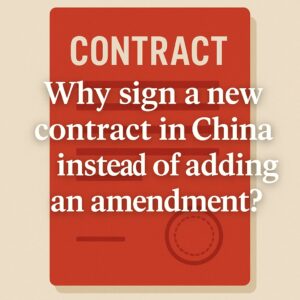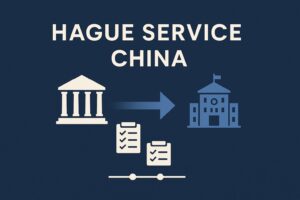The Three Fundamental Rules for China Contracts
To ensure that your contracts are enforceable in China, it is important that they adhere to these three fundamental rules:
- Jurisdiction: Always specify a court within China for resolving legal disputes.
- Governing Law: Ensure that Chinese laws govern the contract.
- Language: Use Mandarin Chinese as the official language of the contract.
Adhering to these principles not only maximizes your chances of contract enforcement, it will also deter your Chinese counterpart from breaching your agreement for fear of the potential legal consequences in doing so.
The Pitfalls of Foreign Jurisdiction
Many foreign companies fall into the trap of drafting contracts that include provisions aligned with their home country’s legal norms, such as specifying dispute resolution in their own country’s courts. This oversight often results in contracts that are unenforceable in China. For instance, when a Chinese court is presented with a request to enforce a judgment from a U.S. court, it typically dismisses it outright due to the absence of a mutual enforcement treaty between China and the United States. See Enforcing U.S. Judgments in China: What You Need to Know.
Arbitration is Not a Panacea
Many foreign attorneys view arbitration as a strategy to sidestep the hurdles associated with enforcing foreign court judgments in China. While it can be a viable solution, it often proves to be a misstep.
Although China has ratified the New York Convention on the Enforcement of Arbitral Awards, which theoretically requires the enforcement of foreign arbitration awards, the practical application diverges markedly. Chinese courts exhibit a pronounced cultural and systemic reluctance to enforce these awards, frequently finding pretexts to dismiss them, particularly at the local level.
The following factors further complicate the enforcement of foreign arbitration awards in China:
- Cultural Resistance: There is a strong cultural reluctance within Chinese courts to enforce foreign arbitration awards. Courts often seek any justification to avoid such enforcement, especially noticeable at the local court level. Sometimes, rather than formally refusing to enforce an award, a court may simply not issue any ruling, allowing the case to stagnate for years.
- Non-Participation in Arbitration: It’s common for Chinese parties to abstain from participating in the arbitration process, leading to default awards. Chinese courts, like their global counterparts, are hesitant to enforce default awards, and the chances of enforcing such awards from foreign arbitration tribunals are notably low. Aware of this, many Chinese attorneys advise their clients against participating in overseas arbitrations.
- Sovereignty Concerns: Chinese courts often perceive compliance with directives from foreign arbitrators as an infringement on national sovereignty, particularly in disputes involving intellectual property or company management that require injunctive relief. This leads to a general disregard for such arbitrator directives.
So, while arbitration may seem appealing, it often fails to provide the expected legal remedy in China.
Language and Legal System Barriers
While our law firm’s China-based lawyers frequently encounter contracts that adhere to the first rule—litigating within China—they often find that these contracts fail to comply with the second and third rules: they stipulate foreign laws and languages instead of Chinese. This common discrepancy often stems from the fact that most foreign lawyers are unfamiliar with both the Chinese language and Chinese law. As a result, they tend to default to the legal frameworks and languages with which they are most comfortable—typically the laws of their client’s home state and the English language.
They justify these choices by pointing to Chinese legal provisions that seemingly permit parties to select their own governing laws and languages. While this is technically true, the reality of Chinese litigation paints a different picture. Contracts drafted in English or governed by foreign laws face substantial hurdles in Chinese courts. These courts are equipped to handle matters under their own legal system and language, and introducing foreign elements complicates proceedings, often leading to unfavorable outcomes for foreign entities. Just imagine attempting to litigate a case in Kalamazoo, Michigan—my hometown!—involving a contract written in Chinese and governed by Chinese law.
This scenario underscores a crucial insight: while Chinese law allows for flexibility in contract terms, practically speaking, aligning with local laws and language is essential for effective litigation and enforcement in China.
Litigating Breach of Contract Cases in China
When litigating breach of contract cases in China under foreign law, the Chinese court requires the parties substantiate what the foreign law stipulates for every pertinent issue. This process of proving foreign law is both time-consuming and costly. Despite these efforts, the outcome of such litigation is often heavily influenced by Chinese legal principles.
Additionally, when dealing with contracts written in a foreign language, Chinese courts typically employ their own translators. Unfortunately, these translators are frequently underqualified, leading to significant discrepancies in critical translations. This often results in disagreements among the parties over the translations, forcing the judge to choose between multiple conflicting interpretations of terms they may not fully understand. In some cases, Chinese courts may even decline to handle cases involving contracts in English or governed by foreign laws, leaving such cases unresolved indefinitely.
Whenever our clients hesitate about drafting their contracts in Chinese, we prompt them to consider a crucial choice: Would they prefer their trusted legal team to ensure the accuracy of the translation, or risk entrusting this critical task to a potentially unreliable court-appointed translator in China, with no certainty about the quality or accuracy of the translation? Moreover, it’s important to remember that any discrepancies in the court’s translation will likely only emerge at advanced stages of the legal proceedings, potentially complicating both the strategies and resolution of the case.
Effective litigation in China demands swift and decisive actions. Chinese legal procedures allow for measures such as the preliminary seizure of assets and other forms of pre-judgment relief, which can be highly effective in swiftly resolving disputes. However, when contracts specify foreign laws or languages, these mechanisms often become unfeasible, leading to prolonged delays and ultimately hindering the ability to secure timely judicial relief.
Conclusion
Ensuring the enforceability of your contracts in China will usually hinge on adhering closely to Chinese legal practices. By drafting your contracts in Mandarin and under Chinese law, and specifying litigation within the Chinese court system, you not only will streamline your dispute resolution process, you will also increase your chances of getting your contract enforced.

























